By Andrew Bonanno, C2C Fellows Program Assistant
Here at the Bard CEP, the C2C Fellows sustainability leadership program hosts quarterly conversations on timely sustainability topics, inviting Fellows from across the country to call in and participate in the conversations. Called C2C Exclusives, these discussions are just one of the many perks of joining the national C2C Fellows Leadership Network.
On December 9th, we hosted “Climate Change: A Nuclear War in Slow Motion”, featuring guest speakers Dr. Bob Musil and C2C Fellow Angie Murdukhayeva. This C2C Exclusive was a great opportunity talk with experts about the importance of effective communication in achieving public policies designed to fight climate change.
 Dr. Bob Musil is a senior fellow at American University’s Center for Congressional and Presidential Studies and former CEO of Physicians for Social Responsibility, a Nobel-Peace Prize winning organization. His new book, Rachel Carson and Her Sisters, comes out in March next year. Angie Murdukhayeva earned her M.S. in Environmental Sciences from Rhode Island University and is currently a US EPA Global Change Research Fellow.
Dr. Bob Musil is a senior fellow at American University’s Center for Congressional and Presidential Studies and former CEO of Physicians for Social Responsibility, a Nobel-Peace Prize winning organization. His new book, Rachel Carson and Her Sisters, comes out in March next year. Angie Murdukhayeva earned her M.S. in Environmental Sciences from Rhode Island University and is currently a US EPA Global Change Research Fellow.
C2C Exclusives are a chance for C2C Fellows to join a conversation via phone conference with leaders in environmental and sustainability politics, policy, science, and business. During our December 9th conversation, we discussed best practices in communicating climate science, uncertainty, and risk to different populations. Dr. Musil reminded us that, when we talk about climate change, we should focus on the effect of a changing climate on people. Climate change will change the rates of heat induced asthma and other respiratory diseases. Epidemiological patterns of various diseases will shift, as formally tropical diseases will be able to migrate northward as temperatures rise. Support for political action that addresses climate change will increase as people are able to identify changes that they (or their communities) have personally experienced, and connect those changes to a warming climate.
This is where work by researchers like Angie is so vital. By mapping the paths of storm surges and the distribution of heat patterns in urban areas, Angie is able to point specifically to the areas and populations that will be most affected by climate change. Often, it’s the must vulnerable populations, such as the elderly or those in poorer neighborhoods, that will be the most effected.
For those of you who missed this conversation, it’s available as a podcast here. Keep an eye out for our next C2C Exclusive in the spring.
In the meantime, from all of us here at the Bard CEP and C2C Fellows, have a happy holiday season!
